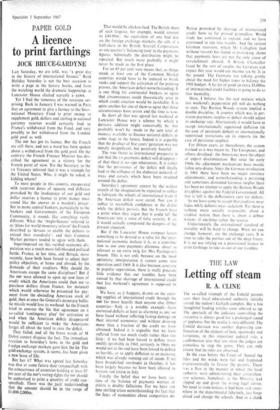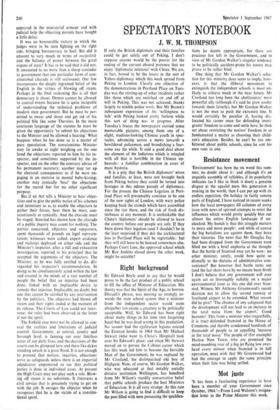Letting off steam
THE LAW R. A. CLINE
The so-called triumph of the Enfield parents over their local educational authority initially' stirred the nation's Goliath complex. But a few thoughtful leading articles soon sobered us up. The spectacle of the judiciary controlling the executive is always good for a prolonged round of applause; but the reality is very different. The Enfield decision was another depressing con- firmation of the element of luck, spasmodic and fortuitous, in this important judicial role, a confirmation also that too often the judges are powerless to stop the game: They can only ensure that its rules are observed.
In the case before the Court of Appeal the tides and the winds were fair and happened practernaturally to favour the parents. There was a flaw in the manner in which the local authority were administering their comprehen- sive schemes, Somebody at the Ministry had slipped up and given the wrong legal advice. No need to issue notices, it had been said some where in the departmental labyrinth, just forge ahead and change the schools. And so a chink appeared in the ministerial armour and with judicial help the objecting parents have bought a little delay.
It was an honourable victory in which the judges were to be seen fighting on the right side, bringing bureaucracy to heel. But did it amount to very much in terms of realpolitik and the balance of power between the great organs of state? It has to be said that it did not. It amounted to no more than a sharp reminder to government that one particular form of con- stitutional charade is still sacrosanct. Our law incorporates the deeply ingrained belief of the English in the virtues of blowing off steam. Perhaps in the final reckoning this is all that democracy is about. Demos cannot be allowed to control events because he is quite incapable of understanding the technical problems of modern state government. But he must be per- mitted to swear and shout and get rid of his political bile like some Thersites. In the more courteous language of the statutes he must be given the opportunity `to submit his objections to the Minister and be allowed a hearing.' What happens when he has done so is a matter of pure speculation. The conscientious Minister may lie awake at night weighing on the one hand the objections reported to him by his in- spector, and sometimes supported by the in- spector, and on the other the contrary advice of his permanent secretary; another may tot up the electoral consequences as if he were en- gaging in an exercise in mental baby-kissing; another may cynically 'hear' the objections for the record but for no other significant purpose.
But if an Act tells a Minister to hear objec- tions and to give the public notice of his schemes and intentions so as to enable the objectors- to gather their forces, hear them he must, con- scientiously or cynically. And the charade must be staged. Stansted has shown how the charade of a public inquiry may count for nothing. The parties concerned, objectors and supporters, spent thousands of- pounds on legal represen- tation; witnesses were called, expert evidence and statistics deployed on either side and the Minister's inspector, after a full and exhaustive investigation, reported to his principal that he accepted the arguments of the objectors. The Minister, as he was fully entitled to do, dis- regarded his inspector's recommendation. In doing so he simultaneously acted within the law and created in the minds of a vast number of people the belief that an injustice had been done, linked with an implacable desire to remedy that injustice. Implacable, no doubt, but one that cannot be satisfied by any intervention by the judiciary. The objectors had blown off steam and their rights ended at the moment of its release. The Courts of Law could not inter- vene; the rules had been observed in the letter if not the spirit.
The Enfield case must not be allowed to con- ceal the realities and limitations of judicial control. Government, at central, county and borough level, is fanning out over limitless areas of our daily lives, and the decisions of the courts can be glimpsed here and there like dykes standing awash in a great flood. It is not enough to pretend that notices, inquiries, objections serve as safeguards unless there is an impartial adjudicator empowered to see that political justice is done in individual cases. At present the High Court may not play such a role. Blow- ing off steam is no substitute. It frustrates a civil service that is genuinely trying to get on with the job. It enrages the objector when he recognises that he is the victim of a constitu- tional spoof.































 Previous page
Previous page